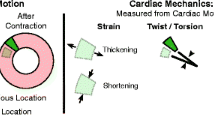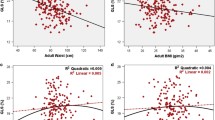Abstract
The prevalence of obesity continues to increase in the developing world. The effects of obesity on the cardiovascular system include changes in systolic and diastolic function. More recently obesity has been linked with impairment of longitudinal myocardial deformation properties in children. We sought to determine the effect of increased body mass index (BMI) on cardiac deformation in a group of children taking part in the population-based Southampton Women’s Survey to detect early cardiovascular changes associated with increasing BMI before established obesity. Sixty-eight children at a mean age of 9.4 years old underwent assessment of longitudinal myocardial deformation in the basal septal segment of the left ventricle (LV) using two-dimensional speckle tracking echocardiography. Parameters of afterload and preload, which may influence deformation, were determined from cardiac magnetic resonance imaging. BMI was determined from the child’s height and weight at the time of echocardiogram. Greater pediatric BMI was associated with greater longitudinal myocardial deformation or strain in the basal septal segment of the LV (β = 1.6, p < 0.001); however, this was not related to contractility or strain rate in this part of the heart (β = 0.001, p = 0.92). The end-diastolic volume of the LV increased with increasing BMI (β = 3.93, p < 0.01). In young children, regional deformation in the LV increases with increasing BMI, whilst normal contractility is maintained. This effect may be explained by the increased preload of the LV associated with increased somatic growth. The long-term implications of this altered physiology need to be followed-up.


Similar content being viewed by others
References
Adda J, Mielot C, Giorgi R, Cransac F, Zirphile X, Donal E et al (2011) Low-flow, low-gradient severe aortic stenosis despite normal ejection fraction is associated with severe left ventricular dysfunction as assessed by speckle-tracking echocardiography: a multicenter study. Circ Cardiovasc Imaging 1:27–35
Alpert MA, Lambert CR, Panayiotou H, Terry BE, Cohen MV, Massey CV et al (1995) Relation of duration of morbid obesity to left ventricular mass, systolic function, and diastolic filling, and effect of weight loss. Am J Cardiol 76(16):1194–1197
Baltabaeva A, Marciniak M, Bijnens B, Moggridge J, He FJ, Antonios TF et al (2008) Regional left ventricular deformation and geometry analysis provides insights in myocardial remodelling in mild to moderate hypertension. Eur J Echocardiogr 9(4):501–508
Barbosa JA, Rodrigues AB, Mota CC, Barbosa MM, Simoes e Silva AC (2011) Cardiovascular dysfunction in obesity and new diagnostic imaging techniques: the role of noninvasive image methods. Vasc Health Risk Manag 7:287–295
Bussadori C, Oliveira P, Arcidiacono C, Saracino A, Nicolosi E, Negura D et al (2011) Right and left ventricular strain and strain rate in young adults before and after percutaneous atrial septal defect closure. Echocardiography 28(7):730–737
Cheung YF, Liang XC, Chan GC, Wong SJ, Ha SY (2010) Myocardial deformation in patients with beta-thalassemia major: a speckle tracking echocardiographic study. Echocardiography 27(3):253–259
Cheung YF, Hong WJ, Chan GC, Wong SJ, Ha SY (2010) Left ventricular myocardial deformation and mechanical dyssynchrony in children with normal ventricular shortening fraction after anthracycline therapy. Heart 96(14):1137–1141
Choi JO, Shin DH, Cho SW, Song YB, Kim JH, Kim YG et al (2008) Effect of preload on left ventricular longitudinal strain by 2D speckle tracking. Echocardiography 25(8):873–879
Danias PG, Tritos NA, Stuber M, Kissinger KV, Salton CJ, Manning WJ (2003) Cardiac structure and function in the obese: a cardiovascular magnetic resonance imaging study. J Cardiovasc Magn Reson 5(3):431–438
Dhuper S, Abdullah RA, Weichbrod L, Mahdi E, Cohen HW (2011) Association of obesity and hypertension with left ventricular geometry and function in children and adolescents. Obesity (Silver Spring) 19(1):128–133
Di Salvo G, Pacileo G, Del Giudice EM, Natale F, Limongelli G, Verrengia M et al (2006) Abnormal myocardial deformation properties in obese, non-hypertensive children: an ambulatory blood pressure monitoring, standard echocardiographic, and strain rate imaging study. Eur Heart J 27(22):2689–2695
Dragulescu A, Mertens LL (2010) Developments in echocardiographic techniques for the evaluation of ventricular function in children. Arch Cardiovasc Dis 103(11–12):603–614
Friberg P, Allansdotter-Johnsson A, Ambring A, Ahl R, Arheden H, Framme J et al (2004) Increased left ventricular mass in obese adolescents. Eur Heart J 25(11):987–992
Friedberg MK, Mertens L (2009) Tissue velocities, strain, and strain rate for echocardiographic assessment of ventricular function in congenital heart disease. Eur J Echocardiogr 10(5):585–593
Gong HP, Tan HW, Fang NN, Song T, Li SH, Zhong M et al (2009) Impaired left ventricular systolic and diastolic function in patients with metabolic syndrome as assessed by strain and strain rate imaging. Diabetes Res Clin Pract 83(3):300–307
Goran M, Fields DA, Hunter GR, Herd SL, Weinsier RL (2000) Total body fat does not influence maximal aerobic capacity. Int J Obesity Relat Metab Disord 24(7):841–848
Ingul CB, Tjonna AE, Stolen TO, Stoylen A, Wisloff U (2010) Impaired cardiac function among obese adolescents: effect of aerobic interval training. Arch J Pediatr Adolesc Med 164(9):852–859
Inskip HM, Godfrey KM, Robinson SM, Law CM, Barker DJ, Cooper C (2006) Cohort profile: the Southampton Women’s survey. Int J Epidemiol 35(1):42–48
Jackson CE, Shirodaria CC, Lee JM, Francis JM, Choudhury RP, Channon KM et al (2009) Reproducibility and accuracy of automated measurement for dynamic arterial lumen area by cardiovascular magnetic resonance. Int J Cardiovasc Imaging 25(8):797–808
Kamal HM, Atwa HA, Saleh OM, Mohamed FA (2011) Echocardiographic evaluation of cardiac structure and function in obese Egyptian adolescents. Cardiol Young 2:1–7
Koopman LP, McCrindle BW, Slorach C, Chahal N, Hui W, Sarkola T et al (2012) Interaction between myocardial and vascular changes in obese children: a pilot study. J Am Soc Echocardiogr 25(4):401–410.e1
Kosmala W, Plaksej R, Strotmann JM, Weigel C, Herrmann S, Niemann M et al (2008) Progression of left ventricular functional abnormalities in hypertensive patients with heart failure: an ultrasonic two-dimensional speckle tracking study. J Am Soc Echocardiogr 21(12):1309–1317
Lorch SM, Sharkey A (2007) Myocardial velocity, strain, and strain rate abnormalities in healthy obese children. J Cardiometab Syndr 2(1):30–34
Mehta SK, Holliday C, Hayduk L, Wiersma L, Richards N, Younoszai A (2004) Comparison of myocardial function in children with body mass indexes >/=25 versus those <25 kg/m2. Am J Cardiol 93(12):1567–1569
Moiduddin N, Asoh K, Slorach C, Benson LN, Friedberg MK (2009) Effect of transcatheter pulmonary valve implantation on short-term right ventricular function as determined by two-dimensional speckle tracking strain and strain rate imaging. Am J Cardiol 104(6):862–867
Nakajima T, Fujioka S, Tokunaga K, Hirobe K, Matsuzawa Y, Tarui S (1985) Noninvasive study of left ventricular performance in obese patients: influence of duration of obesity. Circulation 71(3):481–486
Naylor L, Watts K, Sharpe J, Jones T, Davies E, Ramsay J et al (2006) Effect of resistance and circuit exercise training on left ventricular diastolic function in obese adolescents. Med Sci Sport Exerc 38(5):S41S–S414
Nickola MW, Wold LE, Colligan PB, Wang GJ, Samson WK, Ren J (2000) Leptin attenuates cardiac contraction in rat ventricular myocytes. Role of NO. Hypertension 36(4):501–505
Pascual M, Pascual DA, Soria F, Vicente T, Hernandez AM, Tebar FJ et al (2003) Effects of isolated obesity on systolic and diastolic left ventricular function. Heart 89(10):1152–1156
Peterson LR, Herrero P, Schechtman KB, Racette SB, Waggoner AD, Kisrieva-Ware Z et al (2004) Effect of obesity and insulin resistance on myocardial substrate metabolism and efficiency in young women. Circulation 109(18):2191–2196
Pieper GM, Shah A, Harmann L, Cooley BC, Ionova IA, Migrino RQ (2010) Speckle-tracking 2-dimensional strain echocardiography: a new noninvasive imaging tool to evaluate acute rejection in cardiac transplantation. J Heart Lung Transplant 29(9):1039–1046
Rabbia F, Silke B, Conterno A, Grosso T, De Vito B, Rabbone I et al (2003) Assessment of cardiac autonomic modulation during adolescent obesity. Obesity Res 11(4):541–548
Rowland TW (2007) Effect of obesity on cardiac function in children and adolescents: a review. J Sport Sci Med 6(3):319–326
Vidmar S, Carlin C, Hesketh K, Cole T (2004) Standardizing anthropometric measures in children and adolescents with new functions for egen. Stata J 4(1):50–55
Wong CY, O’Moore-Sullivan T, Leano R, Byrne N, Beller E, Marwick TH (2004) Alterations of left ventricular myocardial characteristics associated with obesity. Circulation 110(19):3081–3087
Yamawaki K, Tanaka H, Matsumoto K, Hiraishi M, Miyoshi T, Kaneko A et al (2012) Impact of left ventricular afterload on longitudinal dyssynchrony in patients with severe aortic stenosis and preserved ejection fraction. Circ J 76(3):744–751
Author information
Authors and Affiliations
Corresponding author
Rights and permissions
About this article
Cite this article
Black, D., Bryant, J., Peebles, C. et al. Increased Regional Deformation of the Left Ventricle in Normal Children With Increased Body Mass Index: Implications for Future Cardiovascular Health. Pediatr Cardiol 35, 315–322 (2014). https://doi.org/10.1007/s00246-013-0778-1
Received:
Accepted:
Published:
Issue Date:
DOI: https://doi.org/10.1007/s00246-013-0778-1




